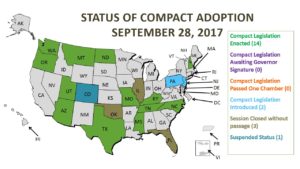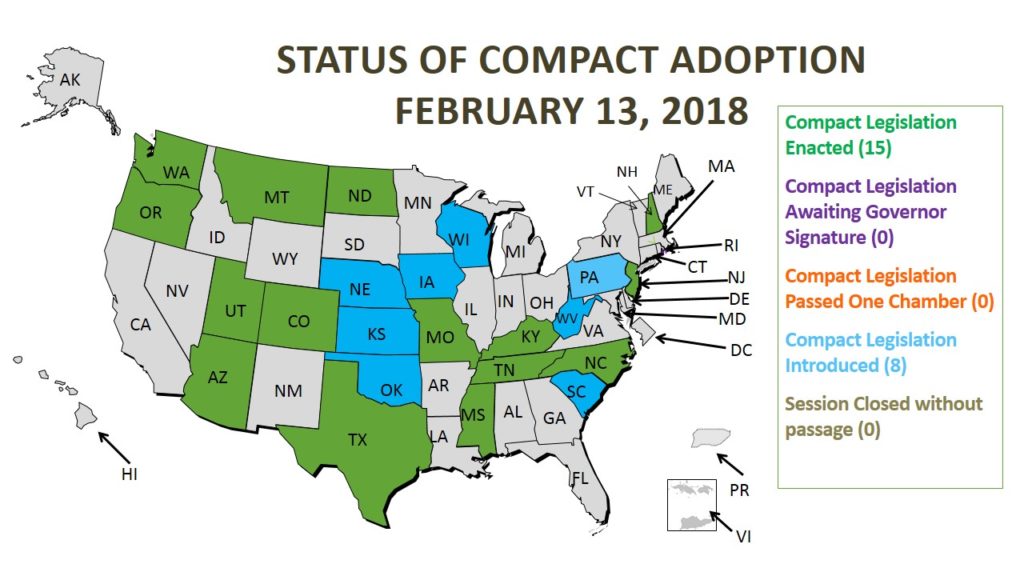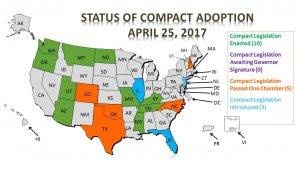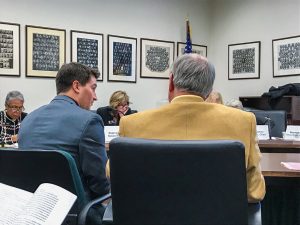The Physical Therapy Compact is marching forward which is good news for a lot of PTs and PTAs currently practicing in compact states. But, by my interpretation, the currently proposed rules which will be voted on next weekend leave a lot of therapists who could utilize the compact out in the cold. Basically, therapists who call any compact state their permanent home will have access to compact privileges, but therapists hoping to access the compact whose permanent address is not in a compact state, or who have no permanent address at all, will not be able to take advantage of the PT licensure compact.
Here is a ink to all current info on the compact including the proposed rules and info on compact commission meetings: http://www.fsbpt.org/FreeResources/PhysicalTherapyLicensureCompact.aspx
Enough of an intro – Below, you will find the letter I have written to the PT Compact Commission about my concerns regarding the new rules and my ongoing concerns about the suspension of Colorado from the compact.
——————————————-

The most current PT Compact map from FSBPT.org. At the start of the new legislative cycle this winter, more states should be introducing the compact.
To Whom It May Concern,
I write from a point of frustration today, but hope that my comments can be productive to the process of developing a compact system that is available and useful to as many Physical Therapists and Assistants as possible.
First, just a brief background on me to help you understand my view points and my frustrations. My wife and I worked as traveling Physical Therapists for 10 years, over that time we held licenses in 7 states each (8 states total). Our permanent address changed frequently due to a variety of reasons including us each coming from different states individually, our parents living in different states, and a flow of life over 10 years that caused our permanent address to change independently of our federal “tax home” address which also changed several times. During my early years of traveling, I was based in Massachusetts, that later changed to Florida, Maine, and Colorado. For several of those early years traveling, I was the lone PT sitting on FSBPT’s Exam Administration Committee. Because of those experiences within with FSBPT, in 2012, I felt at liberty to write a few emails to FSBPT about developing some sort of national licensure registry – later that year, FSBPT leadership had its first conversations (that I am aware of) about pursuing what would eventually become the licensure compact. Earlier this year, my wife and I, now with newborn, settled permanently in Colorado where I made the case to my local APTA leaders to pursue the licensure compact and later testified before state legislators in support of adopting the compact. Over the past several years, I have offered to contribute to the compact development process through FSBPT and also through APTA where I have served in a number of leadership positions through Sections and Chapters, but I was never offered any real opportunities to take part in the compact development. To this point, I have not found the process transparent or easily accessible, so a phone call or a couple emails may be all it takes to explain commission processes and ease my concerns which are listed below.
1. My biggest and most predictable concern is regarding the suspension of Colorado. My information regarding the suspension came to me through asking questions to people who were closer to the initial compact commission meeting and reading the meeting minutes – it seems the initial decision to suspend Colorado came following an executive session and did not consist of much open, transparent conversation. In the months since, I have tried to understand the suspension and am still left not understanding why Colorado would be suspended due to requiring additional consumer protections. I have read the compact commission statement posted on FSBPT many times and fail to see a comprehensive explanation or even an explanation that makes sense. It seems the stance of the commission is that Colorado should change its laws that govern all medical and health professions rather than the commission changing its rules to be more accepting of the variances in regulation it will undoubtedly run into as more jurisdictions become members. In my reading of the draft rules, I expected to find something that would resolve the Colorado suspension, but found nothing that would seem to indicate the commission is trying to reintegrate Colorado into the compact. In the past several months, I have been asked by many traveling PTs and Colorado PTs about the suspension, I have assured them that with time the commission will and must come to its senses and find a way to reintegrate Colorado into the compact. My faith that the commission would want to modify its rules to allow as many states into the compact as possible is being challenged now as months and months pass by. It seems that additional background check requirements would fall right in line with other variances that are explicitly allowed – differences in CEU requirements, differences in state fees, juris prudence exams – why not additional consumer protections? If the commission cannot resolve this small issue, then surely the dream of a majority of states being compact members will not become reality. Again, I have tried to access meaningful information regarding Colorado’s suspension, but it is simply not available – I would truly be happy with a more comprehensive and explanatory statement from the commission on Colorado’s suspension, provided that the rationale behind it actually makes sense.
2. In my reading of the draft rules, I came to a separate, but not unrelated concern regarding the definition of “home state”. As a long-term traveling PT, I may have a perspective that has not been adequately represented to the commission. Traveling PTs often do not have a permanent address, or they have an address that changes often. The definition of “home state” (Rule 1.1, I) and Rule 3.5, B, 2 seem to exclude any PT or PTA from the compact that does not have a permanent residence in a member state or does not have a permanent residence at all. It seems to me that this is EXACTLY the licensees you would want the compact to be open to. The traveling therapist community are the therapists who would most benefit from the compact. They also are undoubtedly the ones cluttering the desks of licensure staffs across the country. In my mind, “home state” should be defined by whichever state a licensee enters the compact through. To be clear, I should be able to live in a non-compact state, hold a valid license in any compact state, and have access to compact privileges. The current language does not allow this, I beg the commission to reconsider with my added view point – traveling PTs are exactly who would use the compact and exactly who clinics in member states want to be attracting to fill their needs. Just last week, while presenting at APTA’s National Student Conclave about careers in travel PT to several hundred students, I commented that compact states would become popular destinations for travelers and that there would high competition for the jobs in those states – with the currently proposed rules, this would not be the case. The current definition of home state means that only therapists originating from compact member states would be able to access compact privileges. Many of the member states that are largely rural will continue to experience difficulties in in filling open PT job positions, and all state licensure staffs will continue to be overburdened by the volume of work they are doing for travelers who could potentially have compact privileges if the “home state” definition were different.
3. Finally, my last point is a brief one, and perhaps one that just needs some clarification or explanation to me. Rule 5.1, C excludes anyone on the board of directors of APTA or any one of its sections, chapters, or councils to not be eligible to be a delegate to the commission. I’m frankly not sure what an APTA council is – is that any committee within APTA? It seems this rule excludes a large portion of Physical Therapists and Assistants who have any interest in policy making from participating in shaping and refining the commission. This is not a handful of PT leaders, but hundreds. Again, I may just need an explanation on this, but it is concerning to me that all leaders in our profession would be excluded from commission leadership.
There is one theme and commonality between each of my concerns, and it is about inclusion of as many therapists as possible in the compact system. So far, what I am seeing is a system that waits for states and individual therapists to comply with commission rules to be included in the compact, rather than a commission that seeks to include as many states and therapists as possible. For the compact to be a truly useful entity, it needs to be available to states to join and available to as many well qualified therapists as possible. I hope the commission will genuinely consider my view points and suggestions. And, again, I am happy to help and contribute to the process, I would love to offer more perspectives of the traveling therapist’s experience in licensure.
Sincerely and Respectfully,
Dr. James Spencer, PT, DPT
Orthopaedic Clinical Specialist
www.HoboHealth.com









